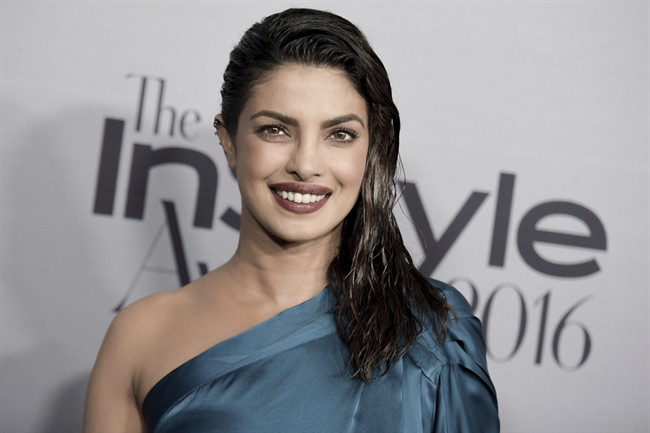A lot more than lipsticks and the latest looks were served at this year’s BeautyCon event in Los Angeles, Calif.

The three-day convention, which brings together throngs of cosmeticians, makeup artists and beauty enthusiasts, also struck up with some unexpected drama.
Beauty maverick and celebrity Priyanka Chopra was one of the speakers at the convention.
During the Q&A session, the actress and UNICEF Goodwill Ambassador was accused of being a “hypocrite” by 28-year old American-Pakistani Ayesha Malik. In more of a comment than a question, Malik referenced a tweet Chopra had posted back in February, shortly after the Indian Army launched airstrikes in Pakistan.
“It was kind of hard hearing you talk about humanity, because, as your neighbour, a Pakistani, I know you are a bit of a hypocrite,” Malik told Chopra. “You are a UNICEF Ambassador for peace and you are encouraging nuclear war against Pakistan.”
READ MORE: Priyanka Chopra called ‘hypocrite’ by Pakistani woman
I don’t necessarily think BeautyCon was the appropriate venue for such a political exchange, especially given the current highly charged situation between India and Pakistan in regards to Kashmir. Nor do I personally have the depth of knowledge to comment on the complexities of the crisis in Kashmir.
But I certainly think there is much to be said about Chopra’s response. I found it gravely disappointing and cringe-worthy to watch. It was not just her words, but her tone, body language and demeanour, which all equated to a scene from the Mean Girls playbook.
Chopra’s unabashed reaction from the get-go was condescending, dismissively telling Malik she would reply to her remarks “whenever you’re done venting.”
She not only effectively mocked but also minimized Malik’s opinions as an emotional outburst instead of listening to her criticism with an open mind. Chopra also went on to say that she has “many, many friends from Pakistan,” as if having Pakistani friends somehow absolved her of any bad behaviour on her part.
As many were quick to call out on social media, those words were reminiscent of that racist acquaintance who reminds you, “I have black friends, too” or “You’re not like those other brown people.”
But it was the way she belittled Malik toward the end of their exchange that I found most uncomfortable, as she talked down at her, calling her “girl” and glibly reprimanded her, saying, “Don’t yell. Don’t embarrass yourself.”
Chopra made herself out to be a victim and sadly, but not surprisingly, the audience lapped it up, which only further revealed the power imbalance between the starlet and the unknown woman, whom she was talking down at.
READ MORE: What to know about India’s changes in Kashmir, and how they will affect the state
Much like her rhetoric earlier in the Q&A session (which is what initially compelled Malik to speak up in the first place, as she later told CNN), Chopra’s response itself seems quite hypocritical and contrary to who she claims to be, in particular as a champion for women’s empowerment.
Literally moments before the exchange, Chopra was waxing lyrical on the importance of women supporting one another and upending the competitive “catfight” narrative.
“The more opportunity we create for each other, the more sisterhood will grow,” Chopra said. “We need to be empowered by each other, by people who are in positions of power, by putting women in positions of power.”
But Chopra’s interaction with a fellow woman, and South Asian woman at that, who expressed her support for Chopra’s work, was not only patronizing and condescending but far from sisterhood or solidarity — an opportunity that a goodwill ambassador of peace very well could have used to unify instead of divide.
WATCH BELOW: Priyanka Chopra confronted by Pakistani woman — ‘You’re a hypocrite’

As a South Asian woman, this exchange was particularly disappointing, because as Malik herself stated, we are big supporters of Chopra and her work. So often we speak about lack of representation and inclusivity in entertainment and on the diversity of people and perspectives (and the often lack thereof) in pop culture. I quite literally host a radio show, kultur’D, which focuses on this precise subject matter.
With so few South Asian women who have made it to these positions of power in mainstream celebrity culture, it stings when one of those few appears so disingenuous.
That said, I don’t subscribe to cancel culture; we are all human, and mistakes are made. And given the mass megaphone and influence that she holds, I hope that Chopra recognizes this, and takes to heed more seriously that with great power and privilege also comes great responsibility. That’s especially true for someone like herself, who has also willingly stepped up to the celebrity activism plate.
And she is not alone in that pursuit. Celebrity activism is becoming ever more prevalent, with stars becoming synonymous with their nearest and dearest causes: for example, Leonardo DiCaprio and environmentalism; Emma Watson and gender equality; and Alyssa Milano and her (sometimes flawed) but fervent fight against the alt-right.
As the lines between celebrity, politics and activism blur, perhaps such a remark towards Chopra was warranted. However, if celebrities are going to take on these significant roles, they must handle them with care. Flippantly spewing words, as Chopra did, like “war is not something that I’m really fond of, but I am patriotic” may not be the most rousing words, but they have the potential for very real and significant consequences.
Celebrity influence can have mass impact — not always as intended and sometimes resulting in more harm than help.
Meera Estrada is a cultural commentator and co-host of kultur’D! on Global News Radio 640 Toronto.



Comments